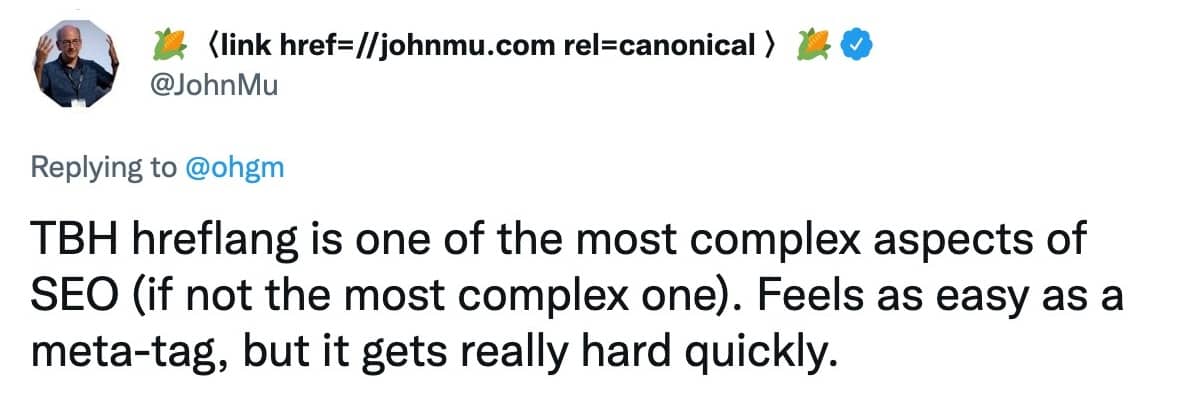Getting your international SEO strategy right can be an elusive feat.
There are a lot more factors at play than people give credit for, and it’s often a thankless job.
A successful international SEO strategy requires a deep knowledge of your company’s commercial strategy as well as technical SEO knowledge, cultural sensitivity, and excellent data skills.
Yet the industry often regards international SEO as just your hreflang setup.
In this article, I will distill the complexities of international SEO success into an actionable step-by-step list that will take you from beginner to advanced practitioner. Let’s begin!
Part I: Be Commercially Aware
1. Understand Why Your Company Is Going International
Companies can grow by expanding their products and services, focusing on gaining market penetration or expanding into new markets.
While your team’s goal might be traffic, leads, or revenue, the leadership team is likely working under a different set of parameters. Most of the time, leadership’s ultimate goal is to maximize shareholder value.
- In founder-owned companies, growth goals might be slower and more sustainable, usually aimed at maintaining and growing profitability.
- VC-owned companies have high growth goals because they must provide their investors with a return that’s higher than the stock market. This is what is known as the alpha, or your company’s ability to beat the market in growth.
- Publicly traded companies are likely aiming to grow their share value.
- Startups, depending on their maturity stage, are likely looking to prove product-market fit or expand their reach fast to show that their operations are scalable and have the potential to be profitable in the future. The goal of this is to aid in raising further capital from investors.
Understanding why businesses go international is essential for informing your SEO decisions. What’s best practice for SEO isn’t always what’s best for business.
You must adapt your strategy to your company’s growth model.
- Companies choosing to grow sustainably and maintain profitability will likely expand more slowly to a market that resembles their core market.
- VC-owned companies will be able to invest in a wider range of countries, with a smaller concern for providing their users with an experience on par with that of their core markets.
- Startups can try to beat their competitors to market by expanding quickly and throwing a lot of money at the project, or they might be concerned with cash flow and try to expand fast but cut corners by using automatic translation.
2. Stack Rank Your Target Markets To Prioritize Your Investment
I promise I’ll get to hreflang implementation soon, but so much about international SEO has to do with commercial awareness – so bear with me; this will make you a better professional.
Many companies have different market tiers to reflect how much of a priority each market is. Market prioritization can happen using many different metrics, such as:
- Average order value or lifetime customer value.
- Amount of investment required.
- Market size.
- And market similarity.
American companies often prioritize developed English-speaking countries such as the UK, Canada, or Australia. These are most similar to their core market, and most of their market knowledge will be transferable.
After that, companies are likely to target large European economies, such as Germany and France. They might also target the LatAm market and Spain in the same effort.
The last prioritization tier can vary widely among companies, with a focus on the Nordic, Brazilian, or Asian markets.
Part II: Know Your Tech
3. Define Your International URL Structure
When doing international SEO, there are 4 different possible URL structures, each with its pros and cons.
ccTLD Structure
A ccTLD structure is set up to target different countries based on the domain type.
This structure is not ideal for companies that target different languages rather than different countries. For example, a .es website is targeting Spain, not the Spanish language.
An advantage to this kind of structure is that the ccTLD sends a very strong localization signal to search engines as to what market they are targeting, and they can lead to improved trust and CTR in your core country.
On the other hand, ccTLDs can dilute your site’s authority, as links will be spread across domains rather than concentrated on the .com.
gTLD With Subdirectories
This is my personal favorite when it comes to international SEO.
These URL structures can look like website.com/en if they’re targeting languages or website.com/en-gb if they’re targeting countries.
This configuration aggregates the authority you gain across your different territories into a single domain, it’s cheaper to maintain, and the .com TLD is widely recognizable by users worldwide.
On the other hand, this setup can look less personalized to people outside the US, who might wonder if you can service their markets.
gTLD With Subdomains
This setup involves placing international content on a subdomain like us.website.com. While once popular, it’s slipping in favor because it doesn’t bring anything unique to the table anymore.
This setup offers a clear signal to users and search engines about the intended audience of a specific subdomain.
However, subdomains often face issues with SEO, as Google tends to view them as separate entities. This separation can dilute link, similar to the ccTLD approach but without the geo-targeting advantages.
gTLD With Parameters
This is the setup where you add parameters at the end of the URL to indicate the language of the page, such as website.com/?lang=en.
I strongly advise against this setup, as it can present multiple technical SEO challenges and trust issues.
4. Understand Your Hreflang Setup
In the words of John Mueller: hreflang can be one of the most complex aspects of SEO.
 Screenshot from Twitter, May 2024
Screenshot from Twitter, May 2024Hreflang reminds me of a multilingual form of a canonical tag, where we tell search engines that one document is a version of the other and explain the relationship between them.
I find hreflang implementation very interesting from a technical point of view. Because development teams mostly manage it, and it can be very much hit or miss.
Often, hreflang is constructed from existing fields in your content management system (CMS) or content database.
You might find that your development team is pulling the HTML lang tag, which follows a different ISO standard than hreflang, leading to a broken implementation.
Other times, there is a field in your CMS that your development team pulls from to build your hreflang setup.
Finding out how your hreflang tags are generated can be extremely helpful in identifying the sources of different issues or mitigating potential risks.
So speak to your engineering team and ask them how you’re currently generating hreflang.
5. Implement Hreflang Without Errors
There are three ways to implement hreflang on your site:
- On your sitemap.
- Through your HTTP header.
- On your HTML head.
The method most of us are most familiar with is the HTML head. And while you can use more than one method, they should match each other perfectly. Otherwise, you risk confusing search engines.
Here are some basic rules for getting it done correctly:
- In your hreflang implementation, the URL must include domain and protocol.
- You must follow the ISO 639-1 language codes – don’t go around making up your own.
- Hreflang tags must be reciprocal. If the page you’re listing as a language alternative does not list you back, your implementation won’t work.
- Audit your hreflang regularly. My favorite tool for this, since it added the hreflang cluster analysis and link graphs, is Ahrefs. For the record, Ahrefs is not paying me to say this; it’s a genuine recommendation and has helped me a lot in my work.
- You should only have one page per language.
- Your hreflang URLs should be self-canonicalizing and respond with a 200 code.
Follow the above rules, and you’ll avoid the most common hreflang mistakes that SEO pros make.
And if you’re interested in the technical SEO aspect beyond hreflang, I recommend reading Mind your language by Rob Owen.
Part III: Invest In Content Incrementally
6. Translate Your Top-performing Content Topics
Now that you have the basic commercial and technical knowledge covered, you’re ready to start creating a content strategy.
You likely have a wealth of content in your core market that can be recycled. But you want to focus on translating high-converting topics, not just any topic; otherwise, you might be wasting your budget!
Let’s go step by step.
Cluster Your Website’s Content By Topic
- Crawl your site using your favorite SEO tool and extract the URL and H1.
- Use ChatGPT to classify that list of URLs into topics. You might already know what you usually write about, so include those topics in your prompt. You don’t want to have a classification that’s too granular, so you can prompt chatGPT to only create groups with a minimum of 10 URLs (adjust this to reflect the size of your website) and class everything else as other. This is an example of what your prompt might look like: “I will provide you with a list of article titles and their corresponding URL. Classify this list into the following topics: survey best practices, research and analysis, employee surveys, market research and others. Return this in a table format with the URL, title and group name.”
- Start a spreadsheet with all your URLs in the first column, titles in the second column, and the group they belong to in the third column.
Measure Your Performance By Topic
- Export your GSC data and use a =VLOOKUP formula to match your clicks to your URLs.
- Export your conversion data and use a =VLOOKUP formula to match your conversions (leads, sales, sign-ups, or revenue) to the right URL.
- You can then copy your topics column onto a new sheet. Remove duplicates and use the =SUMIF formula to aggregate your click data and conversion data by topic.
Choose What Topics You’ll Be Translating First
Using this data, you can now choose what topics are most likely to drive conversions based on your core market data. Choose how many topics or pieces of content you’ll be translating based on your budget.
Personally, I like translating one topic at a time because I’ve found that generating topical authority on one specific topic makes it easier for me to rank on an adjacent topic that I write about next.
7. Localize Your English Content
Once you’re set up with all your key pages and a few content topics, it’s time to evaluate your investment and see where you could be getting a bigger return.
At this stage, many companies have translated their content into a few different languages and likely copied the US content into their UK and Australian sites. Now that you’ve done some translation, it’s time to work on localization.
If you’ve just copied your US content into your UK and Australian sites, your Google Search Console indexing report might be screaming at you, “Duplicate, Google selected a different canonical than the user.”
A very easy fix that could yield great returns is to localize your English content to the nuances of those English-speaking markets.
You will want to instruct your translation and localization providers to adapt the spellings of certain words, change the choice of words, introduce local expressions, and update any cited statistic for the US with their local equivalent.
For example, if I’m targeting a British audience, “analyze” becomes “analyse,” a “stroller” becomes a “pram,” and “soccer” becomes “football.”
8. Invest In In-market Content
Once you’ve got the basics in place, you can start tackling the specific needs of other markets. This strategy is expensive, and you should only use it in your priority markets, but it can really set you apart from your competitors.
For this, you will need to work with a local linguist to identify pain points, use cases, or needs exclusive to your target market.
For example, if France suddenly made it mandatory to run a diversity and inclusion study for companies with over 250 employees, I’d want to know this and create some content on DEI surveys at SurveyMonkey.
9. Integrate With Other Content Workflows
In step six, we evaluated our top-performing content, chose the best articles to translate, and got it all down. But wait. Some of these source articles have been updated. And there is even more content now!
To run a successful international SEO campaign you must integrate with all the other teams publishing content within your organization.
Usually, the teams creating content in an organization are SEO, content, PR, product marketing, demand generation, customer marketing, customer service, customer education, or solutions engineering.
That’s a lot, and you won’t be able to integrate with everyone all at once. Prioritize the teams that create the most revenue-generating content, such as SEO, content, or product marketing.
Working with these teams, you will have to establish a process for what happens when they create a new piece, update some content, or remove an existing piece.
These processes can differ for everyone, but I can tell you what I do with my team and hope it inspires you.
- When a piece of content that’s already been localized into international markets is updated, we get the content in a queue to be re-localized the next quarter.
- When they create a new piece of content, we evaluate its performance, and if it’s performing above average, we add it to a localization queue for the next quarter.
- When they change the URL of a piece of content or delete it, all international sites must follow suit at the same time, since due to some technical limitations, not making the change globally would create some hreflang issues.
Wrapping Up
International SEO is vast and complex, and no article can cover it all, but many interesting resources have been created by SEO pros across the community for those who want to learn more.
Navigating the complexities of international SEO is no small feat. It’s an intricate dance of aligning commercial strategies with technical precision, cultural insights, and data-driven decisions.
From understanding your company’s core motives for global expansion to meticulously implementing hreflang tags and localizing content, every step plays a crucial role in building a successful international presence.
More resources:
- How To Use Market-Specific Conversion Tracking To Drive International SEO Success
- 4 Key Areas Of International SEO Focus For Entering A New Market
- Getting Started In International SEO: A Quick Reference Guide
Featured Image: BritCats Studio/Shutterstock





